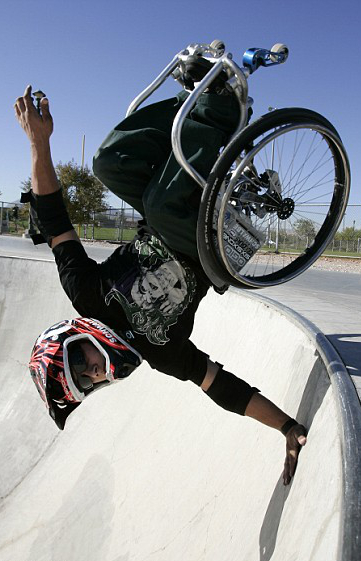Innes buries lifter-leaner claims in push for more work
 The outgoing Australian disability discrimination commissioner has reflected on his years in the role, the state of Australian disability support and workforce, and taken a swipe at the Federal Government.
The outgoing Australian disability discrimination commissioner has reflected on his years in the role, the state of Australian disability support and workforce, and taken a swipe at the Federal Government.
Disability discrimination commissioner Graeme Innes will leave the Human Rights Commission on Friday, two months after his position was axed in the federal budget.
His duties have been pushed onto age discrimination commissioner Susan Ryan.
In a speech to the National Press Club, Mr Innes eloquently and emotionally described the struggles of living with a disability – real and assumed – while pushing for better employment opportunities for an often neglected section of society.
“I have never accepted the concept of “lifters” and “leaners”... it's such a facile concept, and we all move from one role to the other dozens of times a day,” Mr Innes said.
“Many in society force people with disabilities to live within that leaner-lifter rubric. And we would be lifters, if there were not barriers in society which cause us to be leaners.”
“The debate over the National Disability Insurance Scheme has moved disability more into mainstream conversation... [but] greater government and industry support needs to occur fast, if the aims of the NDIS are to be achieved”
“Industry and government are still on their way to the party... as the current deputy chair, I plan to ensure that they arrive, and figuratively BYO.”
Mr Innes also took shots and unhelpful media reportage.
“Disability is a normal part of the diversity of the human experience, and the life of our community, but it's not viewed that way,” he said.
“Fuelled by sensationalist journalism such as that of the Daily Telegraph, running front pages comparing ‘slackers’ (disability support pensioners) to ‘slouch hats’ (soldiers), calling us ‘shirkers’ and ‘rorters’, we are demonised and diminished.
“The pictures of so-called slackers were actually South American backpackers on holiday, and of the 45,000 "slouch hats" who returned to Australia, 20% experience mental illness.
“The Tele gets it wrong on so many counts, and trashes the disability brand, but people with disabilities are the ones who pay the price and wear the damage. The Tele pushes us back into the leaners corner, despite our best efforts to leave it.”
Mr Innes lamented the removal of his position, leaving his duties with a commissioner already in charge of a separate but equally important issue.
He noted the irony that a threatened species commissioner role has been created on the same day that his job ended.
“I could mount an argument fairly effectively that people with a disability are a threatened species,” he said
“Forty-five per cent of us are in poverty and we’re 30 per cent less employed.”








 Print
Print